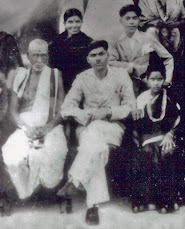Seekers are many; seers are few. Seeing is more important than seeking.
If you have not learnt to see clearly where you are stationed, what more can you see at the next milestone which you make for?
A man who has not seen the beauty of flowers in the local garden goes in vain to seek the beauty of flowers in Kashmir. He can only come back with a photograph of his stupid face amidst the flowers of Kashmir as a certificate of his having really gone to Kashmir.
There is seeing. Seeking comes after and is merely an extension of the seeing.
The act of going is more important than the object of going. So the Buddha was said to have stated.
A man rushes out of the house saying that he is in a great hurry to catch the train to go to Madras to keep an appointment. This great man in a hurry is a tyrant at office and terror to the family. Either he has forgotten the purse which carries the tickets or he has forgotten the letter of appointment. He comes back fuming and fretting and complaining as to how the whole world has conspired to frustrate his rush on the path of glory and victory.
Damn the clerks, damn the wife, damn everybody. He has not just bothered to look clearly for a few minutes at the exact steps of his journey.
Keep the trees, cut down the forest.
This too from the Buddha: A little thought and observation shows how true this is. We are in the middle of a society that grows and protects forests on the files and cuts down trees in the field.
We adore and cherish mental formations ignoring the basic reality underlying the concept. This we constantly do: We move away from concrete realities cognisable by us, and try to rectify this basic error by further and further systematisation and abstractions and general principles, glorified as reality because it is the fashion.
For the uncultivated man, the average perception of the largest number of fashionable persons, raised to a general law becomes the reality.
The philanthropist feeds the poor, because it is good to feed the poor. It does not matter if quite a few of them had just an hour before fed at another philanthropist’s door. He does not give a rupee increase in pay to his clerk whose children go without a meal. The doctor treats schizophrenia, he does not treat Kannamma who sees a ghost in red sari, hears the voice of her neighbour abusing her and has a husband who drinks away all her jewellery and beats her up.
To be aware of the property of the brain to form large undifferentiated mental formations which in turn influence the whole behaviour in more and more unrealistic ways, and to take action to learn to make and break mental formations at will is the essence of Buddhist practice, and forms the cultivable root of civilised human behaviour.











